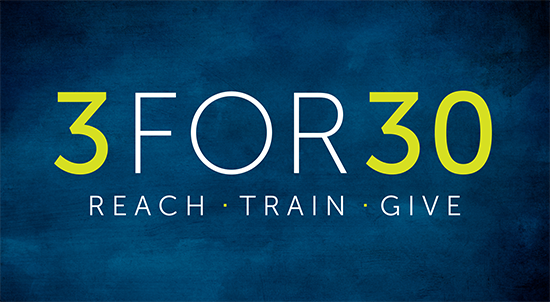
October-November 2020
Around the Corner
------------------
|





better together
by Eddie Moody, Executive Secretary, National Association of Free Will Baptists
Almost a year ago, the leaders of our denomination began to answer questions about the strengths, weaknesses, opportunities, and threats to our denomination. It soon became clear there was a
desire for some overarching goals the entire denomination could work toward. As a result, we began to develop the 3 for 30 Plan—three goals on which we can focus for this decade.
3 for 30
Though the denomination has many areas where attention could be focused, three key areas emerged. Unsurprisingly, Scriptures teach every Christian should excel in all of these. If we focus upon these together, the outcome will be an increasingly capable denomination.
Reach
Influence others by loving and sharing. All Christians are called to reach those in their community, country, and the world with the gospel (Acts 1:8). The key is all (Mark 16:15). We must reach out to those who look and think like us, but also to those who do not. Wherever we go and whatever we do, the Light and the Truth must go forward (Psalm 43:3). As a result, eyes will be opened to the gospel, and people will be turned to God (Acts 26:18).
To excel in this area in this decade, we will strive to become effective in reaching an increasingly biblically illiterate, religiously averse, and ethnically diverse population like the one the early church reached in the book of Acts.
Train
Grow by discipling and equipping (Matthew 28:19-20). We succeed in reaching others only if we train to do so (1 Corinthians 9:24-27). We begin by focusing upon our own children and immediate family (Deuteronomy 6), but each church, association, and national agency plays a role in helping believers grow into effective servants of the Lord.
What kind of training is needed? We start with the basics of the Christian faith, including how to live a pure life, understand and live out biblical gender and sexuality, and how to use the specific, individual gifts God has given to us.
We must identify the challenges faced across the lifespan. Training for the emerging adult (18-29) surrounds marriage, purity, and family relationships. Late/early middle adulthood (30-45) years are often the most stressful. This age range needs training for marriage, child rearing, and getting established in one’s career. Late middle adulthood (45-65) is a very active period, though less stressful. We must help this age range become established in a fruitful ministry. Old age range, which includes postretirement (66-89) and very old age (over 90), is a bit unique to our time period.
People are living longer and enjoying healthier lives than in the past. This creates opportunities for service in the church, but also raises unique challenges such as widowhood and the loss of mobility and, for some, memory. We must seek to provide training for each of these stages of life.
Give
We all have resources and talents we are called to use (Matthew 25). In an environment increasingly hostile toward Christianity, it will be especially important to give (Matthew 5:16). We also have multiple opportunities to bear burdens (Galatians 6:2) because of the great needs around us (James 2:14-17). We must expand upon this, giving with generosity, which is well-pleasing to the Lord.
About the columnist. Better Together is a regular feature of ONE Magazine. Written by Eddie Moody, executive secretary of the National Association of Free Will Baptists, the column explores life and ministry. Have a suggested topic or question? Contact Eddie: emoody@nafwb.org.
|
|

